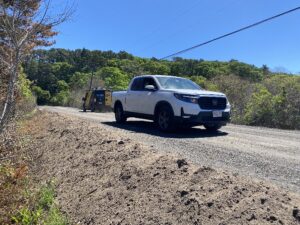WELLFLEET — For most of the winter and spring, repeated flooding has left Bound Brook Island periodically cut off from the rest of town. For months, the island’s 11 property owners worried that they (or their summer tenants) might get trapped there if they tried to use their houses this summer.

Now, it seems those scenarios have been avoided, thanks to the Wellfleet Dept. of Public Works, which raised Old County Road with two and a half feet of gravel.
“All praise due to Jay Norton and DPW,” said Nathaniel Hall Tayloron Bound Brook Island. He thinks the raised road is an effective short-term solution.
As the Independent has reported, erosion at Duck Harbor has created a gap in the coastal bank, allowing seawater to be pushed up into the Herring River floodplain during storms. The water has flooded Old County and Bound Brook Island roads at least four times this year, preventing access to Bound Brook Island.
Although the flooding is unrelated to the Herring River Restoration Project — the overwash that flattened the bank at Duck Harbor was due to natural erosion and sand migration — ultimately, the project will likely be a key part of the long-term solution. The restoration project includes in its early stages a plan to raise low-lying roads including Bound Brook and Old County to allow for increased saltwater flow when the new dike at Chequessett Neck Road is slowly opened.
The first of the recent floods trapped property owner Penelope Jencks on the island overnight on Jan. 13 before she was rescued by the Wellfleet Fire Dept. The incident sparked neighbors’ worries that were similar flooding to happen in the summer more people could end up trapped on the island.
The DPW announced on April 5 that it would do the work rather than seek bids from contractors to avoid a lengthy bidding process and to get the job done. After drawing up plans with the engineering firm WSP, the department began work on the project on May 20. It took five or six employees five days to complete the work, said DPW Director Jay Norton. They used gravel to raise approximately 1,000 feet of road by two and a half feet, he said. The work was completed on May 24, ahead of the town’s stated Memorial Day weekend deadline.
Peter McMahon, the founding director of the Cape Cod Modern House Trust, which manages the Hatch house on Bound Brook Island, said he was relieved to see the work completed. The trust relies on summer rental income to support its restoration and preservation work on the historic modernist houses in its care. McMahon had to cancel the first two weeks of rentals at the Hatch house due to fears of a flood trapping tenants but said that the property is now open, and the trust’s first round of visitors has arrived.
Taylor said that the gravel road has already weathered its first high tides, which occurred in the first week of June.
In the short term, regular maintenance will be required to keep the road elevated. The gravel road is likely to erode due to use and rain, according to a May 24 construction update on the Wellfleet town website, so repairs will be needed throughout its lifespan. The DPW is also planning on adding loam and seed to the sides of the slopes to further support the road, work that Norton said is underway.
Norton said that the bidding process for the larger project to raise the low-lying roads will likely begin in late 2024 or early 2025. He anticipates the work will be completed in two to two and a half years. Until then, the gravel road will be the solution.



